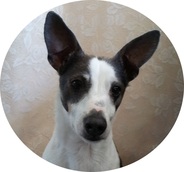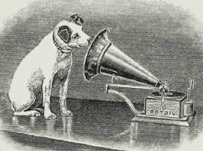The SPCA recently launched HOWL, a helpline for abused dogs which integrates Google Translate with the latest in Canine Voice Recognition software. Dogs can now report ill-treatment, and access rescue services by telephone. The Dog used this technology to compose his first contribution to The Grey Urbanist.
 Guest Columnist
Guest Columnist You may be wondering how, as a dog, I am able to translate my thoughts into a form which you find intelligible. If so, you are obviously not aware of the rapid advancements in dog-friendly technology.
 Guest Columnist Employs Latest Technology
Guest Columnist Employs Latest Technology Alas, can’t read and at my age I’m unlikely to learn how to: unfortunately the adage about old dogs and new tricks is true. However, I am fortunate to have a human companion who has talked with me since I was a young pup. I quickly picked up an understanding of basic human vocabulary and syntax and the code of conduct which dogs are meant to adhere to: no urination or defecation inside the house; no food from the table; no sleeping on beds or couches; no vocalisations except those intended to warn of intruders; no chasing of chickens, cats or sheep; animals must walk at the heels of their human companions and come promptly when called. I gather from my neighbourhood acquaintances that many dogs abide by these anthropocentric rules.
Some dogs - Labradors for example – are tail-wagging pleasers of the worst kind. All it takes is a few swipes of a rolled up Nelson Mail and a doggy treat and they fall into line. Terriers are temperamentally immune to such bullying are thus spared such ignominy.
I developed a more sophisticated vocabulary very rapidly because my human is a great fan of audio books and pod-casts which she plays on the car stereo or through loudspeakers at home. I am able to listen in, absorbing information and ideas from a great many books without actually being able to read.
The first thing I learned from all this reading-by-ear was that you can’t tell a book by its cover. I listened carefully to The Curious Incident of the Dog in the Night-time only to discover that it's not really about dogs at all. I sat through quite a few movies - Dog Day Afternoon and Reservoir Dogs for example - before I realised that you can’t tell a DVD by its cover either.
The second thing I learned was that humans use “dog” in many pejorative ways: dog eat dog, sick as a dog, dog-eared, dog in a manger, crooked as a dog’s hind leg, son of a bitch and so on. And for some inexplicable reason humans think that only black dogs suffer from depression although I’ve known white, brown and even polka-dotted dogs who are melancholics.
If you can overlook these peculiarities of human language then reading is an absolute joy. One of my favourite books is Animal Farm, although I think “four legs good, two legs bad” is a slightly simplistic world view. Cats and rodents have four legs and they aren't good, are they? Walter the Farting Dog by William Kotzwinkle was hilarious. Knitting with Dog Hair by Kendall Crolius was just plain silly. Raw Meaty Bones by that Australian Tom Lonsdale, was brilliant and you just can’t fault Stanley Coren’s books on dog behaviour. I can confirm the accuracy of his thesis that “terriers are bred to bark”. His book on The Intelligence of Dogs can't be beaten and How to Speak Dog should be helpful to humans. Jeffrey Masson has explained Why Dogs never Lie About Love but if you like a tear-jerker ,read Dominion: The Power of Man, the Suffering of Animals and the Call to Mercy by Matthew Scully. Dog Years: A Memoir by the poet Mark Doty is guaranteed to make you weep too.
I've recently taken to poetry like … well … like a dog to water. Billy Collins is my current favourite. His poem Dharma opens with a charming stanza :
The way the dog trots out the front door
every morning
without a hat or an umbrella
without any money
or the keys to her dog house
never fails to fill the saucer of my heart
with milky admiration.
And then there’s his poem The Revenant, in which a dog addresses his hated master from beyond the grave:
I am the dog you put to sleep
as you like to call the needle of oblivion
come back to tell you this simple thing:
never liked you - not one bit.
Although I love the verbal expression of meaning, I’m happiest when my human and I communicate without words. When she settles down on the couch to read or write she makes a place for me beside her. I nestle against her big, warm human body and rest my head in her lap. My conscious mind slips its leash and my thoughts drift pleasantly from the half-gnawed bone which awaits me in the yard to memories of the densely aromatic walks we have taken together past chicken-coops, compost heaps, duck puddles and rabbit burrows. I become a deep pool of do-nothingness.
My human will often pause in the scribbling of one of her anxious to-do lists and stroke my head. Or she’ll look up from a difficult passage in her book and gaze into my eyes. Then we are just two animals, a two legged animal and a four-legged one, in blissful wordless communion.
 RSS Feed
RSS Feed

